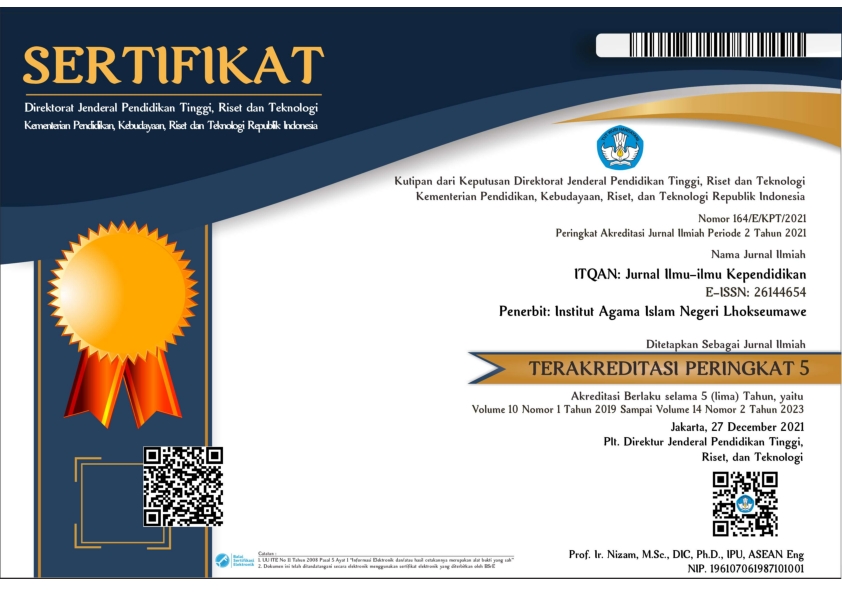Membentuk Karakter Peserta Didik melalui Pendidikan Agama Islam: Studi pada TK Daru Musthafa Al-Jannah
Main Article Content
Nelly Agustina
Anri Saputra
Jamilah Thahir
Rizky Afriyanti Harahap
Fatimatu Hotimah
This study aims to explore the role of religious education in shaping the character of students at the Musthafa Aljannah Kindergarten, and to provide recommendations for improving learning approaches tailored to the needs of the students. The research method employed is qualitative with a descriptive approach, utilizing observation, interviews, and document analysis techniques. The results of the study indicate that religious education plays a significant role in shaping the values and character of students, with learning approaches suitable for children, such as role-playing, interactive storytelling, and artistic activities. The research recommendations include the need for active family involvement in religious education, the integration of religious values into the curriculum, and the development of creative learning methods appropriate for the students' developmental levels. It is hoped that the results of this research will contribute significantly to the understanding and implementation of religious education at the Musthafa Aljannah Kindergarten, serving as a basis for the development of more effective learning programs for shaping children's characters positively.
Ananda, R. (2017). Implementasi Nilai-nilai Moral dan Agama pada Anak Usia Dini. Jurnal Obsesi : Jurnal Pendidikan Anak Usia Dini, 1(1), 19. https://doi.org/10.31004/obsesi.v1i1.28.
Anisah, A. S. (2017). Pola Asuh Orang Tua dan Implikasinya terhadap Pembentukan Karakter Anak. Jurnal Pendidikan UNIGA, 5(1), 70–84. https://journal.uniga.ac.id/index.php/JP/article/view/43.
Arikunto, S. (2019). Prosedur Penelitian Suatu Pendekatan Praktik. Rineka cipta.
Banks, J. A., & Banks, C. A. M. (2015). Multicultural Education. Routledge.
Harisah, A. (2018). Filsafat Pendidikan Islam Prinsip dan Dasar Pengembangan. Deepublish.
Hendayani, M. (2019). Problematika Pengembangan Karakter Peserta Didik di Era 4.0. Jurnal Penelitian Pendidikan Islam, 7(2), 183. https://doi.org/10.36667/jppi.v7i2.368.
Huberman, M., & J, S. (2014). Qualitative Data Analysis, A Methods Sourcebook. Terjemahan Tjetjep Rohindi Rohidi (3rd ed.). UI-Press.
Mannuhung, S. (2019). Penanggulangan Tingkat Kenakalan Remaja dengan Bimbingan Agama Islam. To Maega | Jurnal Pengabdian Masyarakat, 2(1), 9. https://doi.org/10.35914/tomaega.v2i1.234.
Rahayu, D. W. (2016). Internalisasi Nilai Karakter melalui Budaya Sekolah. Buana Pendidikan: Jurnal Fakultas Keguruan dan Ilmu Pendidikan Unipa Surabaya, 12(22), 49–68. https://jurnal.unipasby.ac.id/index.php/jurnal_buana_pendidikan/article/view/618.
Rahmah, S., & Fadhli, M. (2021). Character Education in Islamic Education Institutions: A Study on the Impact of Lecturer Competence at IAIN Lhokseumawe. MIQOT: Jurnal Ilmu-Ilmu Keislaman, 45(1), 87. https://doi.org/10.30821/miqot.v45i1.771.
Salabi, A. S. (2021a). Konstruksi Keilmuan Islam (Studi Pemikiran Ibnu Rusyd tentang Ontologi dan Epistimologi). ITQAN: Jurnal Ilmu-Ilmu Kependidikan, 12(1), 47–66. https://doi.org/https://doi.org/10.47766/itqan.v12i1.188.
Salabi, A. S. (2021b). Pendidikan Karakter Berbasis Gender: Studi Kasus di Taman Kanak-Kanak Putroe Nahrisyah Lhokseumawe. Saree: Research in Gender Studies, 3(2), 219–228. https://journal.iainlhokseumawe.ac.id/index.php/saree/article/view/625.
Salabi, A. S. (2021c). Pengembangan Lembaga Pendidikan Islam dalam Penguatan Pendidikan Karakter. Halimi: Journal of Education, 2(1), 69–92. http://ejournal.kopertais4.or.id/madura/index.php/halimi/article/view/4947.
Subagia, I. N. (2021). Pendidikan Karakter: Pola, Peran, Implikasi, dalam Pembinaan Remaja Hindu. Nilacakra.
Sugiyono. (2020). Metode Penelitian Kualitatif. Alfabeta.
Yani, A. (2017). Implementasi Islamic Parenting dalam Membentuk Karakter Anak Usia Dini di RA At-Taqwa Kota Cirebon. AWLADY : Jurnal Pendidikan Anak, 3(1). https://doi.org/10.24235/awlady.v3i1.1464.
Zulaikhah, S. (2019). Penguatan Pendidikan Karakter Melalui Pendidikan Agama Islam di SMPN 3 Bandar Lampung. Al-Tadzkiyyah: Jurnal Pendidikan Islam, 10(1), 83–93. https://doi.org/10.24042/atjpi.v10i1.3558.




